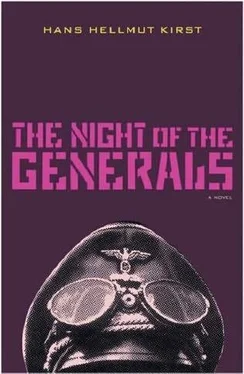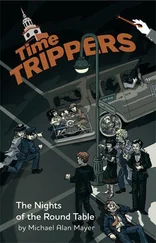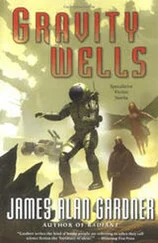Engel picked up his glass and silently held it to the light.
Major Grau passed a hand across his eyes as though dazzled, then continued in the same urbane tone. “Of course, generalizations are always absurd. Not all generals are epic figures or political time-servers. I’ve no doubt there are some worthy men among them.”
“Some bastards too—eh, Major?” said Engel. “And one of them’s the man we’re after—eh?”
“That’s about the size of it,” said Grau.
INTERIM REPORT
FURTHER DOCUMENTS
Extracts from diaries and letters, also an excerpt from a situation report and the results of further inquiries.
Extracts from a diary kept by Frau Wilhelmine von Seydlitz-Gabler. This journal, entitled “My Personal War Diary” and comprising several volumes, was made available only after protracted negotiations with the authoress’s relatives, in whom sole rights are vested.
Warsaw 1942
“How grim this city would seem if Herbert were, not here. His pure and kindly nature sheds a sort of universal radiance. Clarity of thought is his distinguishing characteristic. I need hardly say that I am proud of him, but it is pride coupled with humility.
“How popular he is with his staff! I really believe they would go through fire for him. And how wonderful that their regard for him extends to myself. Do I deserve it? When I asked my husband he said yes—another proof of his greatness.
“Arranged a small luncheon party today. Everything went swimmingly, as far as it ever can in this city. Quite a festive table, of which Herbert the undisputed centre of attention. On his right: General Tanz, one of the Reich’s finest soldiers and many times decorated. Touching, the well-bred gallantry with which he paid court to Ulrike, our daughter! Ulrike was deeply impressed but tried not to show it. Young people are like that, but our experience of life will guard her against making any silly mistakes.
“At a convenient moment I said to General Tanz, in confidence: ‘I’m so glad that it’s you who are to work with my husband at this important juncture.’ And I added, spontaneously: ‘My husband thinks the world of you!’ Whereupon Tanz: The feeling is mutual!’ What more is there to say?
“Herbert is literally wearing himself out. He works all day and even during the night. A few days ago he didn’t get to bed until dawn. How touchingly anxious he was not to wake me! I couldn’t bring myself to disillusion him. Later, when I tidied his clothes, which he had thrown down untidily in a state of utter exhaustion, I was horrified to see traces of blood on them. He must have been visiting the front, but he didn’t make the slightest fuss about it. How typical of him!”
Situation report by Lieutenant-General Tanz, commanding Nibelungen Division.
Written in Warsaw in 1942 and prepared in quintuplicate: one copy for the Corps Commander, one for Supreme Headquarters, Wehrmacht, one for the Reichsführer S.S. and two further copies for filing. One copy of this reposes in the “Collection of Historic Documents” in Warsaw. What follows is the fourth paragraph of the report, which originally comprised seven type-written sheets: “As things stand now, there is obviously no longer room for so-called subtlety and flexibility, i. e., caution. Our efforts should much rather be directed toward a radical solution. The population of Warsaw is dangerous. Nothing further can be achieved by kindness and consideration. An uprising could occur at any moment. The fact that German soldiers have been shot down from ambush is established beyond doubt. Casualties are not yet heavy—in the past week only seven men lost as against three hundred and sixty-four deaths inflicted in the course of immediate reprisals—but this figure could increase overnight. I therefore find myself compelled to urge unremitting severity.”
Deposition by ex-Corporal Otto recorded on tape in summer 1960. All that are reproduced here are extracts which appear to have a bearing on the events in Warsaw and their sequel.
“I’m a sensitive sort of chap—always have been. I enjoy talking, but I can’t understand why everyone harps on the Hartmann business. Hartmann was a nut-case, I tell you for a fact.
“There was something odd about Hartmann. If I’d thought about it properly at the time I could have told how everything was going to turn out. Some people snuff it as easily as others catch cold. Hartmann was like that. He always used to say: ‘How can I help it? I ask you—how can a donkey help having long ears?” It wouldn’t have mattered what Hartmann did, believe me, the final result would have been the same.
“Gentle as a lamb, he was. The women used to go gooey-eyed when they looked at him. He was a good-natured lad, too. You could have a game of cards with him and he’d never go off the deep end when he lost. He lost most of the time, I might add.”
Deposition by ex-Sergeant Engel, also recorded eighteen years later. Like all statements made by Herr Engel (and sundry other individuals) it was subject to the express qualification: “as far as I can remember.”
“Don’t ask me what sort of person Major Grau was. I don’t know. I worked with him for nearly two years but I never got to the bottom of him. To look at the man you’d think he was mild as milk, but he could be stubborn as a mule when he wanted to be. He was no respecter of persons. I once heard him tell Gauleiter Koch, the Reich Commissioner: ‘I’m not interested in what you represent here, only in what you do!’
“He knew his job, there’s no doubt about that. He had ideas, too. I once saw a letter on his desk from Admiral Canaris. It began ‘My dear Gottfried.’ Gave me quite a turn, I can tell you. I never even knew that Major Grau’s Christian name was Gottfried.
“Life was full of surprises when he was around. There were days when I didn’t know whether to treat him like a friend or an enemy. Once, he even said to me—referring to a general—‘You can’t tame a mad dog!’”
Major-General Kahlenberge, Chief of Staff to the Corps Commander, liked to pretend that he enjoyed choral singing. As a matter of fact, he didn’t, but as he once said to a friend: “Men who sing can’t think, and men who can’t think make congenial subordinates—so let them sing. It makes a senior officer’s job that much less complicated.”
Kahlenberge often sat and listened to the G.H.Q. choir going through its paces. This choir—a male voice ensemble, needless to say—was drawn from every branch of the Corps Commander’s staff. The sergeant cook was a member, as was the chief of the map-making section; clerks sang beside technicians, the leading tenor was a signaller and the mightiest bass belonged to a medical orderly. The choir-master’s duties were performed by a dentist who enjoyed a great reputation as a festival conductor in his home town. He conducted with verve and endurance but wasted no time on musical subtleties.
“Westerwald!” General Kahlenberge called encouragingly.
The choir, which had just been allowed a short break for throat-clearing and nose-blowing, set to again with a will. Kahlenberge leant back comfortably in his chair and stretched his legs. The other ranks’ mess hall in the cellar of the Liechnowski Palace, which provided the venue for this prodigal outpouring of emotion, seemed to quake.
Without warning, the singers’ fervour suddenly redoubled in intensity. Kahlenberge was at a loss to explain this phenomenon until he swivelled round in his seat and beheld the G.O.C. He rose to his feet with decorum and came to attention. The choir continued to sing lustily of the wind that blew so cold in the Westerwald.
The G.O.C. took his Chief of Staff by the arm and led him out into the cellar passage. When von Seydlitz-Gabler treated one of his subordinates with this degree of intimacy his motives were bound to be interesting. Kahlenberge’s eyes began to gleam like those of a cat scenting a plump mouse.
Читать дальше












